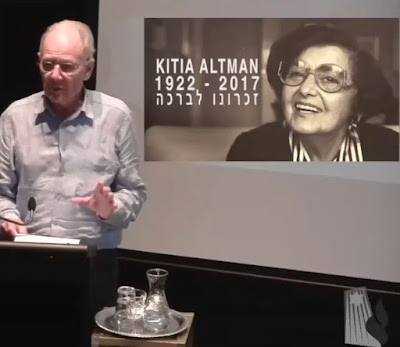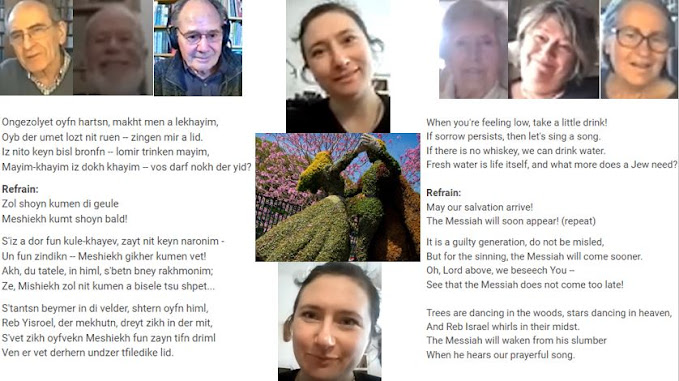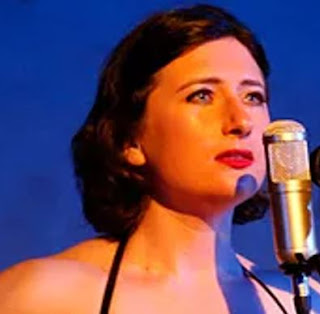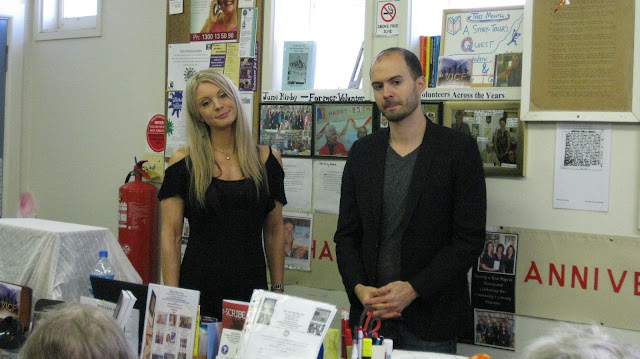Zoom Review: United in Voice: Zooming with Alex Miller & Galit Klas to Honour MAX - 11am, Saturday, 18 September 2021
Zoom Review
United in Voice:
Zooming
with
to Honour MAX
On the 18th of September 2021,
Mentone Public Library’s ‘Zoom Room’
was treated to an engaging talk
by twice winner of the
Miles Franklin Literary Award,
where he recounted the process
behind writing his novel,
‘MAX’.
In her introduction,
Julia recalled how she met
Alex and wife Stephanie Millerwhen they came to the
Jewish Holocaust Centre’s library in 2015
looking for information
about the subject of Alex's next book:
Unable to help Alex directly with findings,
but bestowing to him
a compilation of research leads,
a mutual friend would set Alex on his way.
Retired Jewish Holocaust Centre
volunteer and Holocaust survivor
was able to release Alex from his hesitation
in her typical, no-uncertain-terms manner:
“Cast your doubts aside and get on with it, Miller.”
We were shown a touching
memorial tribute by Alexto the late
that he presented at the
Jewish Holocaust Centre in 2019.
Injected with Alex’s
dry sense of humour in parts,
he retold a snippet of a conversation with her,
where he had determined he would steer away
from the Holocaust because he believed
it was a sacred subject that belonged only to survivors.
Kitia replied:
“The Holocaust belongs to humanity.”
Alex eventually became convinced
that Max and the Holocaust
were intertwined.
We were then mesmerised as
City of Kingston raised
singer-writer-actor-director
sang a beautiful, heartfelt
rendition of the song
a cappella style, in Yiddish.
© Board of Regents University of Michigan-Dearborn:
Click to hear survivor Lily Fenster's recitation: HERE
Alex was also clearly moved by
Galit’s tribute to Max and was almost
rendered speechless for a moment.
He went on to describe in detail
when Max and he first met at a dinner party
and how they formed a special bond very quickly.
A friendship sustained by unconditional love,
Max fuelled Alex’s passion for literature.
He passionately told us all that
he wanted to memorialise Max;
and in fact,
although Max had never said it explicitly,
Alex felt that Max expected him to do just that.
REVIEW PART TWO
by
Sharni Brazier
Alex received from the
Head Programmer of the
Jewish Writers’ Festival in Sydney
(to which he had been invited)
stirred all of us at this online author talk:
“There’s something you say in
Max that is not true”.
Alex was somewhat taken aback,
given his rigorous dedication
to researching and writing the truth.
“You say there’s only two people in the world
for whom Max made a difference:
his niece, and you…”, she took a breath:
“But you gave him to us and now
he’s OUR hero to celebrate.”
Alex took this as an affirmation
of the success of his book
and was buoyed by the sentiment.
It stands testament to the gift
of sharing and illuminating
true stories of lives
that would otherwise stay hidden,
and how stories take a cherished place
in each reader’s heart.
Max’s story now belongs to us all.
Our speaker, Alex, has a quiet,
stately, reserved manner.
He speaks slowly, deliberately, assuredly –
there is gravitas in what he states.
This is mirrored by Alex’s
descriptions of Max Blatt himself;
it is clear that Alex found
a kindred spirit in Max, and vice versa.
A case in point was Alex
reflecting when he and Max
sat in his living room by the fire,
sharing a cup of tea, and Max suddenly revealed...
“I was broken by torture
(at the hands of a Gestapo officer),
broken by the realisation
that my tormentor was my brother.”
Yet Alex was equally struck
that Max hadn’t lost all hope in turn,
that hope occupied another realm
of survival and resilience.
the Treblinka song to illustrate this:
of singing about the future,
of optimism, despite the bitter irony
of the foreboding situation
with which they were faced.
Alex’s meeting with Max’s niece Liat
in Israel allowed Alex to discover what happened
to Max’s family during the Holocaust,
forming the concluding third section
of "MAX" and granting Alex a sense of closure.
Galit punctuated this by performing the song
With an engaging introduction:
‘If you’re feeling sad, and these are difficult times,
what can really lift your spirits… is vodka.
But if you don’t have vodka, well, drink water.
And you can sing a song.
A song of hope…’
With these words, she sang joy into the room.
Library president Graeme Johnstone
summarised that Alex spoke with love
of his friend Max, the quiet philosopher.
Julia spoke of Hirsh Glick/Glik,
a Jewish poet from Vilna
who became a partisan
during the Holocaust.
He had met Australian Holocaust survivor
and founder of the testimonies department at
Melbourne’s Jewish Holocaust Centre,
in Vilna Ghetto’s underground resistance.
Phillip was present when Hirsh
recited for the first time
"The Partisan Song":
“Zog Nit Keynmol” = “Never Say”
Though Hirsh Glick/Glik
was gunned down in Estonia
fighting against the Nazis in 1944,
“The Partisan Song”
survived and is performed to this day
at Holocaust commemorations worldwide.
Julia said that Hirsh Glick/Glik’s
own rousing poem
transcending his lifetime
and continuing to inspire today
was a testament
to the power within ourselves
to make a lasting difference.
“Remember: do what you can
while you are here.”
certified the message by performing for us
“The Partisan Song”
Accompanied only by piano,
her defiant voice marched assuredly
spurring us onward.
Like the rest of the event, it was a moving experience.
Continue Following the Narrative Paths
of Our Storytellers:
Our Literary Storyteller
"MAX"
Referenced Websites:










































Comments
Post a Comment